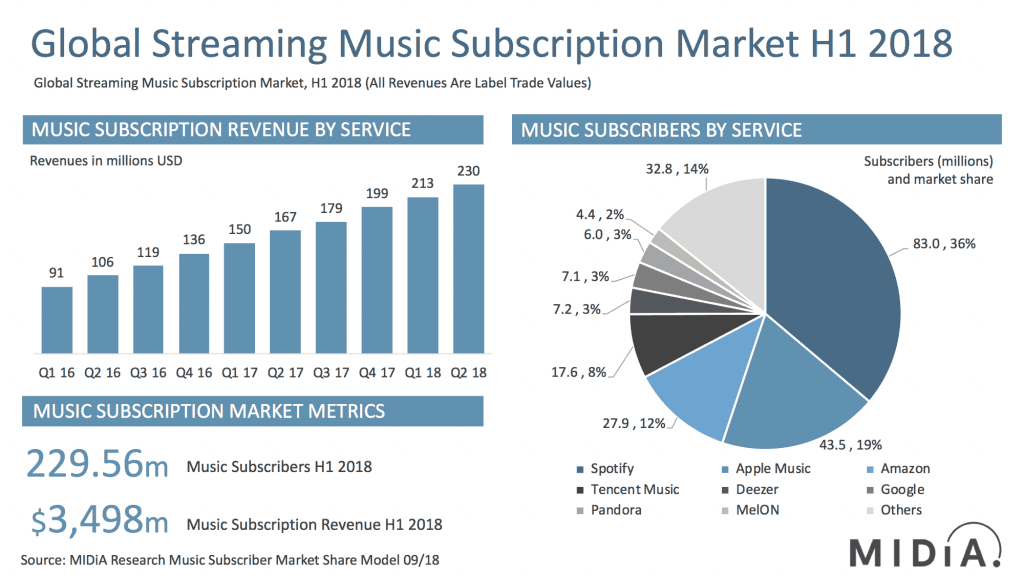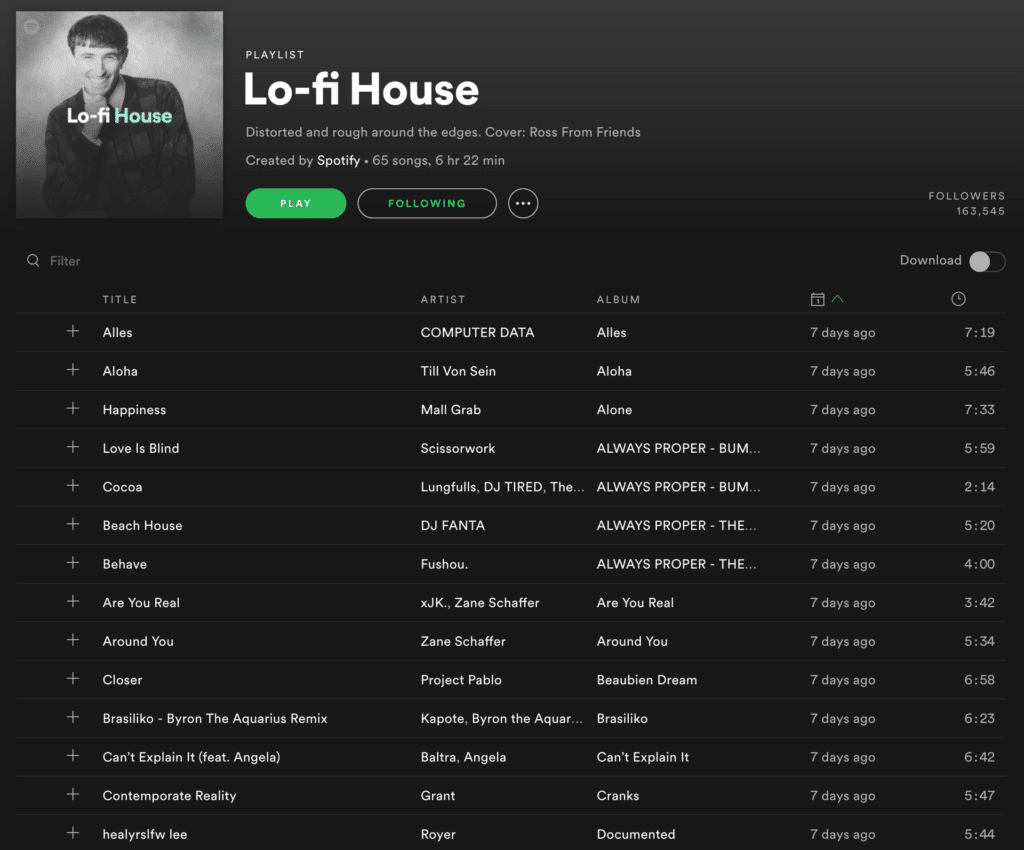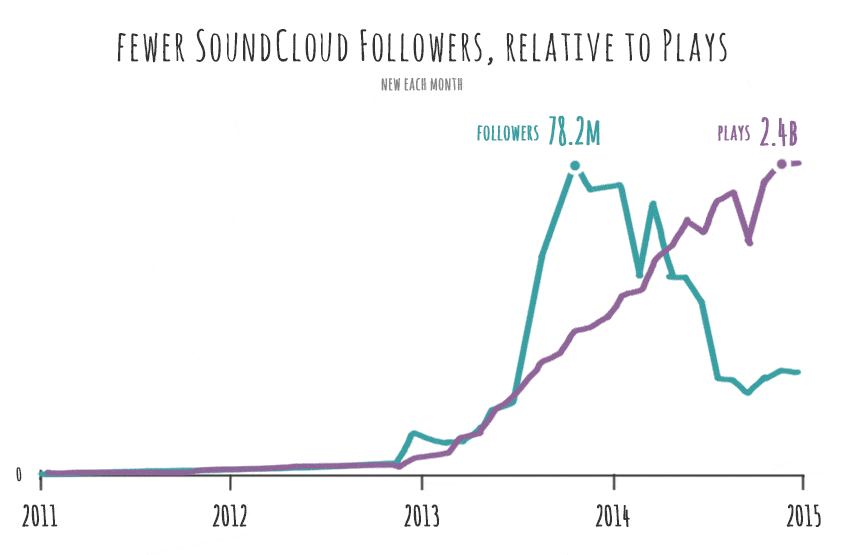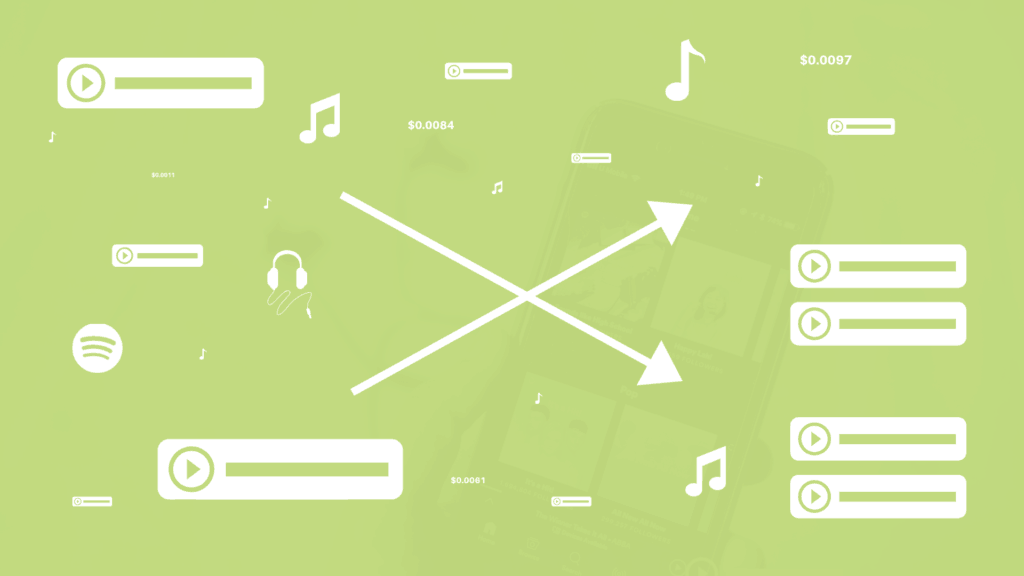Anybody who’s starting anything ever will tell you that it’s a long grind to get to where you want to be, and it all involves building an artist brand.
The music world hasn’t been spared from this inconvenient and universal truth. Artists put in the hours, the weeks and the years to reach a place where they can say they’ve ‘made it’. We’ve published a lot of advice on marketing and branding, including launching a previous course – Build Your Artist Career – which is focused around branding. So of course, we all know it’s important already, and has been for a long time.
So we run into an interesting dilemma when we view the artist brand through the lens of streaming services. They have not only changed music listening habits, nor have they just changed the way artists make money. There’s something bigger and longer-term at stake here.
Confused? You’ll see what I mean.
New to music production? 🧑💻
Watch our Free Masterclass on how to learn electronic music production the smart way (without months of confusion & frustration) 👇
A Post-Streaming World
I think it’s safe to say that we live in a post-streaming world. What do I mean by that? I mean that giants like Spotify and Apple Music are already dominating a large market share of music consumption.

Digital music sales (MP3s etc.) are decreasing every year, CD sales are decreasing every year (obviously) and streaming has hit an almost plateau in terms of consumption. The only strange exception to this rule is vinyl sales, which seem to be in a revival phase. The western world could hardly listen to more music if we tried. Streaming gives us literal unlimited access to almost all the music in the recorded world. It’s truly a miracle.
For artists, this amount of revenue means that smaller and independent artists can gain access to a larger audience and finally get a slice of the pie, albeit not much (in most cases). It’s still challenging, because it’s not just more money, but more music to compete with.
But how has this shift shaped factors beyond the way music is simply consumed? Beyond how artists are getting paid right now? What about the artist’s careers? We’ve heard the arguments for and against streaming royalties, but not so much a long-term view on the issue.
Playlists are King

A few years ago I walked into a café I often visited not too far from where I grew up. I walked into the tune of a Sigur Rós song and complimented the staff’s choice of music selection while I was ordering my Flat White.
“I dunno, it’s just on the playlist we chose,” was the response I got, as the cashier stared down at the iPad to see what was playing.
I was a bit confused at first, but then something happened in my head. This made me realise something profound – people are consuming more music of artists they haven’t even heard of. People can get thousands in streaming royalties without converting even 0.1% of them to becoming fans, all because of playlists.
Why Playlists?
Playlists, which are the cornerstone of many streaming services (like Spotify) have commoditised music more so then we have ever seen before. In a way, we’ve seen the musician become a playlist filler. It’s their way of streamlining quality in an over-saturated market – and it’s working. Listeners love nothing more than to hear a bunch more music similar to what they like.
We’ve seen mixed responses to this commodification, with some people criticizing streaming services’ royalty payout rates, with others praising the companies for providing artists with a scalable form of income, especially for artists who don’t want to rely on touring as much. We could talk about the ethics of music creation too, and how streaming services have encouraged homogenization of production to ensure familiarity between songs, but that’s another discussion.
Streaming’s ‘Quick Buck’ Problem

But the problem has now become that artists are largely unknown. Take Soundcloud, for example. Streams and followers have seen an inverse trend over the years – people listen but they don’t follow. I’ve got artist internet friends who are thousands of kilometres away, being listened to by my friends who live metres down the road, without my local friends knowing anything about the artist – all because of playlists.
Why? I suspect it’s probably to do with market over-saturation – too many damn producers and musicians. So you need a way to filter through the noise, and unless you’re also a DJ, most producers don’t flaunt their selecting skills. And even then, DJ sets aren’t an amazing way of discovering music, mostly due to the lack of tracklisting and consequential ‘ID?” comments they receive in turn.
The thing is, that this isn’t really bad, especially financially. Depending on Spotify’s Revenue Share Model, you can earn quite an especially decent amount of money. And once you get into the 100’s of thousands and millions, you can get some decent coin. Although it’s constantly fluctuating, I’ve had friends earning $10000’s of dollars this way. So artists are getting paid well (in some cases, not all), and it’s providing a great way for smaller artists to get discovered? How exactly is this bad in any way?
Like YouTube’s monetization controversy for creators on the platform, relying heavily on income from Spotify could prove to be an equally catastrophic mistake for musicians and producers. It works well, for now.
New to music production? 🧑💻
Watch our Free Masterclass on how to learn electronic music production the smart way (without months of confusion & frustration) 👇
Is The Artist Brand Dead?
Regardless of what’s happening in the short-term or long term, this kind of scenario begs the question – should artists bother following trivial advice like ‘build an artist brand’ if they can potentially make a living without it?
I’ve got friends that are independent musicians who earn more profit from streaming royalties than they do from shows, but that’s dependant on genre and place. But this was something that wasn’t possible even 10 years ago. As stated before, these people haven’t really got an amazing artist brand, at least not yet.
In the long-term, music consumption doesn’t seem to have much of a place to go apart from streaming growing and growing, unless something else comes out of nowhere and blows us all away, like generative music (that actually sounds good). Is it worth just sticking to Spotify, streaming and the algorithms?
Headphone Music Wins
On the one hand, artists whose music isn’t suited to live performance can finally make a decent amount from streamers who are listening in all sorts of environments. We’ve truly universalized context in terms of music listening. Someone could be in their bedroom, listening to lo-fi hip hop while studying for their finals, or someone hiking up the side of a snowy mountain, listening to heavy metal to give them the final push of motivation they need.
Maybe there is just so much music and artist profiles floating around the internet, that we no longer can keep track of our favourite artists, and we leave that heavy lifting to the tastemakers. This isn’t a particularly new idea (with YouTube promotional channels and labels being around for years), but it certainly seems to have hit a critical density, where anyone with a sense of taste can create a musical influencer brand.
The Case For Brand Building
Should we leave the brand stuff to these guys? Maybe, because they’re still helping to build yours in the process. Brand building isn’t a one-way street. But it’s definitely still important to know what your artist brand is and to focus on that. Maybe yours is to be mysterious, or maybe it’s to be frivolous, or maybe to be innocent and humble. Whatever yours is, know it and nail it.
Although Spotify is most likely here to stay, what if it doesn’t? There’s still risk with putting too much faith into these platforms, especially when they are experiencing frequent losses. What is streaming is phased out by something bigger? Again, difficult to imagine, but possible.
Why would an artist brand help in this scenario? Because McDonald’s could collapse tomorrow, and build again from the ground up with a near guarantee of success because people know the brand. They know McDonald’s and what to expect. Could you do the same if say, streaming was outlawed or made impossible (unlikely as it may be)?
Brands transcend platforms and exist in the minds of your fans and listeners. That’s why people (like us) hammer on about the importance of them.
What Should I Do?

At the end of the day, you can’t really ever go wrong with building an artist brand. Why? It future-proofs you.
Don’t Put Your Eggs in One Basket
So what’s a great way to build a brand? To be on multiple platforms. So paradoxically, if you’re not on Spotify, you definitely should be. Yes, it’s possible to get listened to without anybody knowing who you are as a brand, but it’s still more likely that you’ll gain some sort of following from simply being present on the platform.
But the key part of that paragraph is to be on multiple platforms. Spotify isn’t enough, and relying on it solely could cause you to run into trouble. Continue to use platforms like Instagram and Facebook to show the other side of your brand, your personality, what you’re working on etc. You don’t need to be on all platforms like some people would advise you, because that’s unrealistic. But choose 2-3 good ones to focus on.
Go Beyond The Music
If I’m being honest, I can’t see streaming services going away any time soon. But their payment models and relationships with artists are incredibly volatile, so as I’ve already repeated multiple times – don’t forsake your own brand. It might be more difficult to build in a streaming-centric world, but unless you’re in this for the short term, work towards the more worthwhile prospect of having a solid artist brand.
How do I build a brand? You can check our guide here. It’s also worth noting that networking is crucial to getting brand-building opportunities.
Try Something New (That’s You)
Confusing title, but what I mean by this is to do something that nobody else is doing. Now after reading so much vague advice like this, I should know that this is easy to say but hard to do. But it’s true that the easiest way to remember anyone for anything is when they do something unique.
To say that leaves endless possibilities. But to narrow them down, pick something you’re good at, and bring that to the table. Obviously you’re good at music, but maybe get more specific, or bring another skill you’ve got to the table. Play your music in weird places and film yourself. Be known for your creative music videos. Do something that resembles you.
This weird era in the music industry gives us this important reminder for a reason – everything can seem great (like streaming payouts), until it isn’t. Have a brand that rides the waves of the music industry.
Missed something? Confused? Need brand advice? Hit me up at [email protected] and let me know.
And if you’re brand new to the world of music production, check our our free training below 👇
New to music production? 🧑💻
Watch our Free Masterclass on how to learn electronic music production the smart way (without months of confusion & frustration) 👇

